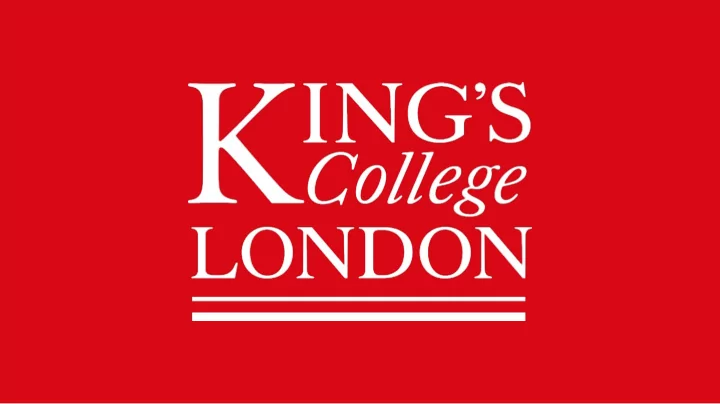

Training at King’s Professor David Bartlett – Prosthodontics Faculty of Dentistry, Oral & Craniofacial Sciences
Features of the Prosthodontics course ▪ Full-time (3 year - 5 days/week or 4 year – 3 days/week) course ▪ UK/EU tend to follow 4 year course ▪ In total our trainees provide ▪ 4500 crowns per year ▪ 300 dentures ▪ £3,000,000 implants ▪ 7000 patient visits per year
Provides clinical experience ▪ Conventional partial and complete dentures (20 each) ▪ Minimal preparation bridges (5-10) ▪ Management of tooth wear, aesthetics, increases in OVD, re-organised occlusion (4-5 big cases) ▪ Implant supported crowns, bridges and dentures (20 each) ▪ Evidence based approach ▪ CADCAM
Year 1 ▪ Core course ▪ Overview of NHS, GSTT processes and procedures ▪ Combined approach to restorative knowledge and other specialties ▪ Prosthodontic specialty knowledge ▪ Evidence based assessment of the literature ▪ Phantom head course ▪ Laboratory course on dentures and crowns ▪ Introduction to clinical care
Year 2 ▪ Further training in clinical cases ▪ Start implant care with simple cases ▪ Commence more complex care with prosthodontics ▪ Conventional care and learn how to provide excellence in prosthodontics ▪ Research project ▪ Provide lab work for patients ▪ Temporaries/ provisionals ▪ Diagnostic wax ups ▪ Stents, michigan splints
Year 3 and 4 ▪ Further clinical experience ▪ Consultant clinics – interdisciplinary care ▪ Start to achieve confidence in some areas ▪ Own diagnostics and mock ups ▪ Focus on cases for exit exam ▪ Written exams in May and June con-joint with MRD
The largest specialist training centre for endodontics in the world (probably!) Professor Francesco Mannocci
Endodontology • 29 specialist trainees in endodontics • 20 full time and part time members of staff • Two separate locations in Guy’s and King’s College Hospitals • Intense exposure to trauma cases at KCH • One of the most intense clinical exposures in the world of endodontics • Brand new facilities
Endodontology • Research projects include many clinical trials • Close collaboration with 4 PhD students • Close collaboration with the online MSc programme in endodontics • Free access to the online material of the MSc in endodontics
Periodontology Professor Luigi Nibali
“Why” Periodontology at King’s? • Very important discipline at the basis of Oral Health • Detailed knowledge of evidence-base to inform treatment • Exposure to a wide range of clinical cases and scenarios • Exposure to multidisciplinary settings and cases • Exposure to advanced research settings and procedures • Teaching from recognised World experts in the field • Potential to maintain a connection with Periodontology Unit at the end of the programme
Variety of clinical experience • Treatment of moderately and severely compromised cases • Treatment of patients with advanced periodontal and restorative needs • Treatment of patients who are extremely susceptible to periodontal problems • Non-surgical therapy/ motivational therapy • Surgical therapies: • Access flap surgeries • Minimally-invasive techniques • Regenerative techniques • Periodontal plastic surgery • Alveolar ridge reconstruction • Microsurgical procedures • Implant placement and restoration • Restorative dentistry • Interactions with Endodontics, Prosthodontics, Oral Medicine, Orthodontics and Sedation
Year 1 (of 4-year programme)* • Core course • Overview of NHS, GSTT processes and procedures • Combined approach to restorative knowledge and other specialties • Periodontology specialty knowledge • Evidence based assessment of the literature and biometrics • Phantom head course • Introduction to clinical care • Clinical Treatment • New patient clinics • Tutorials, seminars and case presentations • Weekly journal clubs • Start research project *the course components for the 3-year programme are compressed into 3 years.
Year 2 (of 4-year programme)* • Seminars, tutorials, implant training, research seminars • Weekly journal clubs • Clinical treatment • Simple surgical cases *the course components for the 3-year programme are compressed into 3 years.
Year 3 (of 4-year programme)* • Seminars • Weekly journal clubs • Complex surgical cases/ develop advanced surgical techniques • Commence implant and multidisciplinary cases • Monthly case presentations and discussion *the course components for the 3-year programme are compressed into 3 years.
Year 4 (of 4-year programme)* • Monthly case presentations and discussion • Weekly journal clubs • Complete advanced surgical, implant and restorative cases • Complete research project • Complete audits • Examinations *the course components for the 3-year programme are compressed into 3 years.
Thank you! kcl.ac.uk/dental-postgraduate /KingsDentistry @KingsDentistry /KingsDentistry dental-postgraduate@kcl.ac.uk www.kcl.ac.uk/dental-postgraduate
Recommend
More recommend